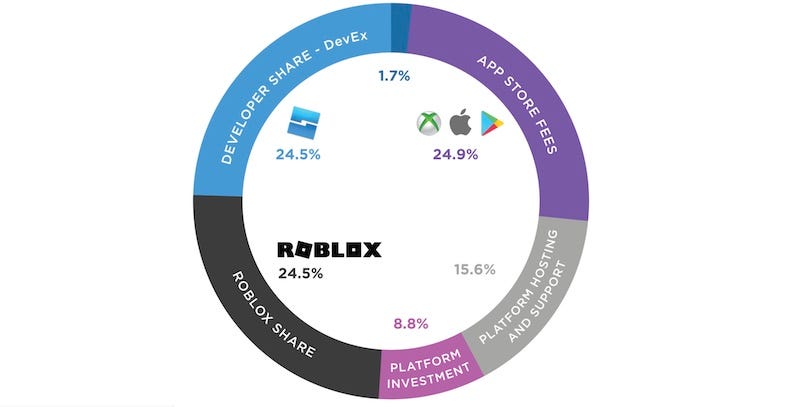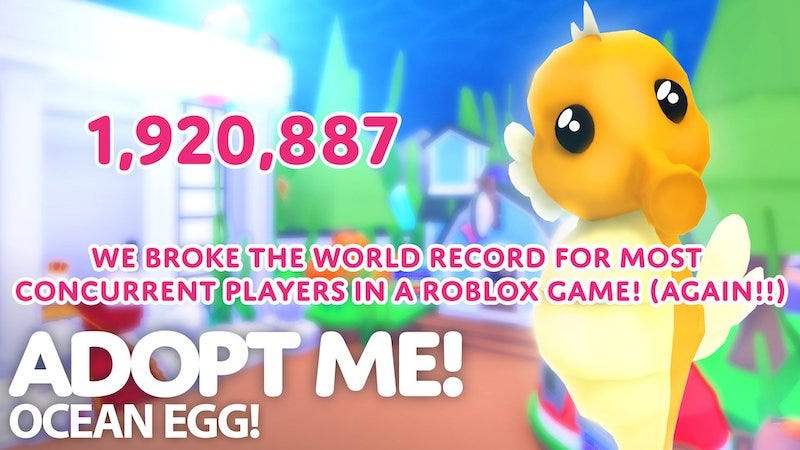You probably know at least a little about Roblox, since it’s kind of a big deal right now. Every time I go to Target with my kid, we see Roblox and Minecraft action figures inundating the toy aisles, and according to this CNN Business explainer, as many as 75% of American children ages 9 through 12 play Roblox regularly with friends. (If you listen to some in the Epic/Apple trial, it’s not ‘a game within a game’, but… yeh.)

And what differentiates the game from Minecraft – which does allow you to sell levels and skins, but is a lot more selective – is that anyone can go ahead and try to make games within Roblox with more complex mechanics, and try to get them to take off. So yes, it’s a platform with discovery questions of its own.
If you read Roblox’s page about this, the company notes: “A unique advantage of the Roblox platform is its inherent social fabric of over 30 million daily users enjoying close to 2.5 billion hours of engagement each month. The social connections users create on Roblox make it easier for developers to leverage network effects and achieve viral growth. In fact, users on Roblox engage in and explore over 20 unique experiences per month.”
So naturally, this is leading to devs considering making games for Roblox professionally. But.. the kind of games that are popular in Roblox are not always the kind you might be used to.
One of the best ‘explainers’ I’ve seen recently is from Australian dev Marigold Bartlett, who notes: “Most of the games on Roblox seem to be half-baked, broken, made by people who are either very young, or otherwise definitely not professional developers. Quite a few, though, including all of the vaguely popular ones, as well as the games on my list, are large-scale efforts which have clearly taken a ton of work and consideration. They may be made by people who are indeed very young, but also by people who are well past the point of amateurism.”
So this is why you’re seeing start-up game studios like Supersocial, “an indie games studio focused on creating insanely fun games for the metaverse, starting with Roblox”, or Talewind, a UK company planning on doing similarly. And companies like Uplift Games (who make Roblox smash Adopt Me!) are expanding rapidly due to record concurrents:

There’s a belief that planning and professionalism can help Roblox games break through. Alongside this, a few indie devs have become fascinated with the platform and just decided to make experimental titles – Dicey Dungeons creator Terry Cavanagh’s ‘Climb The Giant Man Obby’ being a great example – here’s his Twitter thread on how dev went.
But the sandbox nature of Roblox, and the ability of the user-base to not sweat the aesthetics has flipped the script a bit. Bartlett comments in her explainer: “The best games we’ve played have felt as if they’re unrestricted by the common ‘rules’ of being a ‘good’ game developer in a professional context; ugly graphics and questionable physics are both expected and forgiven, which is conducive to a lot of truly novel experiences unique to Roblox.”
And then there’s compenstion. If you look at the revenue share explanation – see the top image in this section – yes, it is saying that devs get 24.5% revenue share for any Robux spent on your Roblox game. Then you realize it’ll be harder to make a profit than many other platforms. (Especially because multiplayer games tend to favor ‘winner takes all’ situations. But hey, you could be that winner…)
But there’s still something here. And I found this Vice profile of Uplift Games (Adopt Me!) to be very helpful in terms of vocalizing what a more dedicated/pro dev team could bring to this, if they can actually break through with an idea.
Uplift’s Josh Ling comments: “There’s this demand for that weekly content drive and these young people don’t necessarily have the experience to deal with that… they just work themselves to the point of burnout and then they stop updating the game for a few months and then it falls off the charts. And you see this cycle repeat again and again.”
So… the concept of producing a hit Roblox game and then leveraging your GaaS skills to keep it going seems to be the main pitch for professionals entering the Roblox dev environment. (I don’t personally think ‘making more game-y games’ is necessarily what the target audience wants, but YMMV.) And can any of these new studios do it? I guess we’ll find out!
[Simon is founder at GameDiscoverCo, a new agency based around one simple issue: how do players find, buy and enjoy your premium PC or console game? You can subscribe to GameDiscoverCo Plus to get access to exclusive newsletters, interactive daily rankings of every unreleased Steam game, and lots more besides.]
